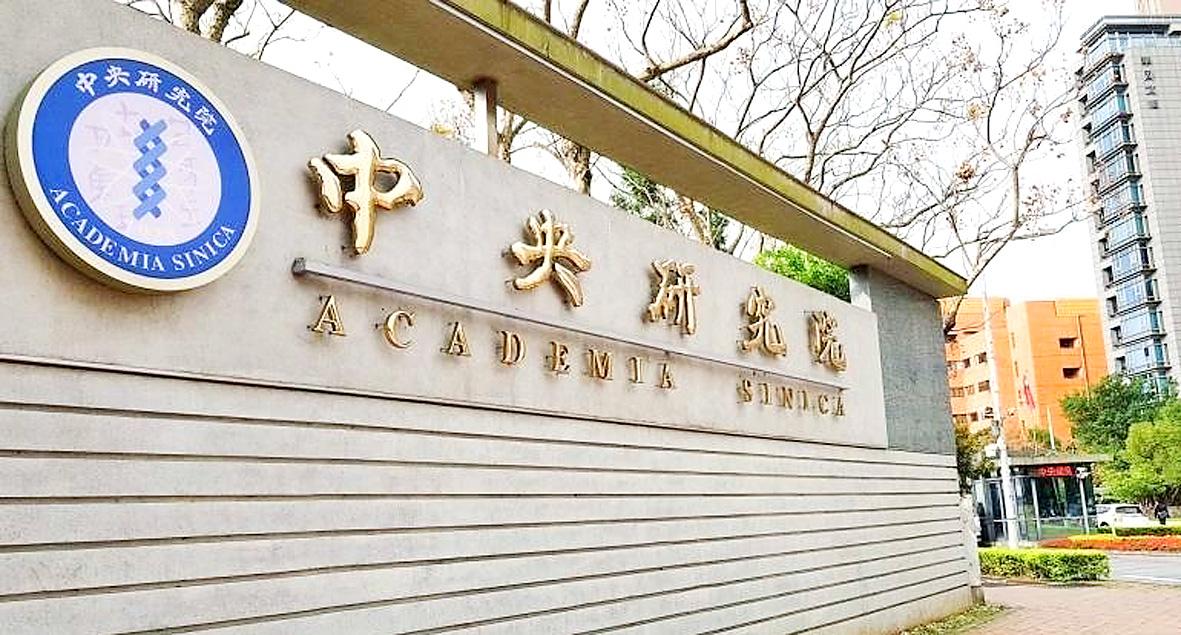Academia Sinica is to confer coveted academician membership only to distinguished academics who are Republic of China (ROC) citizens starting next year, its spokesman Kenneth Wu (伍焜玉) said yesterday.
His comment came a day after the institution announced the change to qualification rules in a news release marking the opening of the 34th Convocation of Academicians.
Candidates for becoming academicians would be required to state whether they are Republic of China citizens in writing during the application process for next year, but the rule change does not affect this year’s convocation, he said.

Photo: Yang Yuan-ting, Taipei Times
The institution is mulling the establishment of foreign and honorary academicians as separate honors from national academicians, which would require the legislature to amend the Organic Act of the Academia Sinica (中央研究院組織法), he said.
As the creation of new types of academicians would be a significant change for the institution, it would proceed cautiously with a mind to building a consensus, he added.
Academicianship is a lifelong, non-remunerated position granted to academics of Chinese descent in recognition of outstanding achievement regardless of their citizenship.
Citing the Nationality Act (國籍法), some academicians said that the nation’s citizenship laws are based on descent, which means anyone with a parent born in China before 1949 is legally a citizen of the Republic of China
“This qualifies half of China as potential candidates for academicianship,” they said, suggesting that Academia Sinica should specify that academicians must have a Republic of China passport or national identification card.

CHAOS: Iranians took to the streets playing celebratory music after reports of Khamenei’s death on Saturday, while mourners also gathered in Tehran yesterday Iranian Supreme Leader Ayatollah Ali Khamenei was killed in a major attack on Iran launched by Israel and the US, throwing the future of the Islamic republic into doubt and raising the risk of regional instability. Iranian state television and the state-run IRNA news agency announced the 86-year-old’s death early yesterday. US President Donald Trump said it gave Iranians their “greatest chance” to “take back” their country. The announcements came after a joint US and Israeli aerial bombardment that targeted Iranian military and governmental sites. Trump said the “heavy and pinpoint bombing” would continue through the week or as long

TRUST: The KMT said it respected the US’ timing and considerations, and hoped it would continue to honor its commitments to helping Taiwan bolster its defenses and deterrence US President Donald Trump is delaying a multibillion-dollar arms sale to Taiwan to ensure his visit to Beijing is successful, a New York Times report said. The weapons sales package has stalled in the US Department of State, the report said, citing US officials it did not identify. The White House has told agencies not to push forward ahead of Trump’s meeting with Chinese President Xi Jinping (習近平), it said. The two last month held a phone call to discuss trade and geopolitical flashpoints ahead of the summit. Xi raised the Taiwan issue and urged the US to handle arms sales to

State-run CPC Corp, Taiwan (CPC, 台灣中油) yesterday said that it had confirmed on Saturday night with its liquefied natural gas (LNG) and crude oil suppliers that shipments are proceeding as scheduled and that domestic supplies remain unaffected. The CPC yesterday announced the gasoline and diesel prices will rise by NT$0.2 and NT$0.4 per liter, respectively, starting Monday, citing Middle East tensions and blizzards in the eastern United States. CPC also iterated it has been reducing the proportion of crude oil imports from the Middle East and diversifying its supply sources in the past few years in response to geopolitical risks, expanding

Pro-democracy media tycoon Jimmy Lai’s (黎智英) fraud conviction and prison sentence were yesterday overturned by a Hong Kong court, in a surprise legal decision that comes soon after Lai was jailed for 20 years on a separate national security charge. Judges Jeremy Poon (潘兆初), Anthea Pang (彭寶琴) and Derek Pang (彭偉昌) said in the judgement that they allowed the appeal from Lai, and another defendant in the case, to proceed, as a lower court judge had “erred.” “The Court of Appeal gave them leave to appeal against their conviction, allowed their appeals, quashed the convictions and set aside the sentences,” the judges